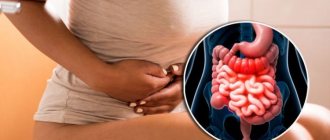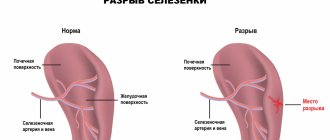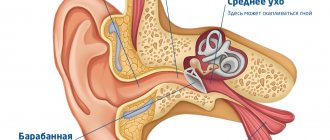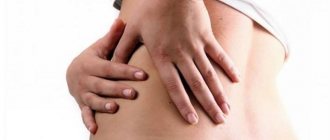Critical days are a difficult period in the life of every woman. It is accompanied by changes in hormonal levels and a number of specific symptoms, from nausea and breast tenderness to pain in the lower abdomen.
Depending on the intensity and frequency, pain during menstruation can be a variation of the norm. However, this is often due to the presence of any violations of the girl’s reproductive system.
It is very difficult to understand on your own why your stomach hurts during menstruation, and the lack of proper treatment can lead to serious problems. Therefore, with this symptom, it is better to immediately contact a gynecologist at the clinic for qualified medical help.
Classification of dysmenorrhea
The answer to the question of why your stomach hurts during menstruation can be answered by a gynecologist. Scientifically, this condition is referred to as dysmenorrhea. Two types of dysmenorrhea can be distinguished depending on the reasons that caused it:
- Primary. This diagnosis is made if the reason why the lower abdomen hurts during menstruation is clearly unknown. In this case, we can often talk about the hereditary nature of the disease. It also affects girls under the age of 25, smokers and those whose first menstruation occurs later than normal. Usually the problem disappears completely with the onset of sexual activity or after the birth of a child.
- Secondary. This type of dysmenorrhea most often occurs in women over 30 years of age and is associated with a gynecological disease and/or previous surgery.
Depending on the severity, three degrees can be distinguished:
- Mild - moderate stomach pain during menstruation, but the woman is able to tolerate these sensations and continues to lead her usual lifestyle;
- Moderate - painful periods, accompanied by weakness, nausea, weakness, and unstable emotional state.
- Severe - unbearably severe pain during menstruation, incapacitating. Accompanied by vomiting, serious malaise, including loss of consciousness.
When should you see a doctor for abdominal pain?
Consult your doctor in the following cases:
- the pain gains intensity and intensifies quickly;
- abdominal pain that is prolonged or recurring;
- stomach pain and difficulty swallowing;
- loss of appetite;
- weight loss for no reason;
- constant nausea and vomiting;
- abdominal pain radiating to the chest, shoulder, arm;
- pain and feeling of heaviness in the right hypochondrium;
- yellowing of the skin;
- difficulty urinating, painful urination;
- too rare or too frequent urge to urinate;
- severe pain during menstruation;
- unusual vaginal discharge, bleeding;
- prolonged (several days) diarrhea;
- prolonged constipation;
- blood in vomit or stool;
- fever;
- increased sweating (cold, sticky sweat).
Causes of severe abdominal pain during menstruation
In order to understand how to relieve pain during menstruation, you need to identify the true cause of these sensations.
With primary dysmenorrhea, there are no pathological changes in the genital organs.
The reason is that a woman’s body produces powerful hormone-like substances - prostaglandins.
During menstruation, their content increases sharply, resulting in pronounced spastic contractions of muscles and arteries in the uterus. Because of this, toxic metabolic products accumulate in the uterus, which irritate the nerve endings, causing severe pain.
Since the uterus is located in the pelvis and is close to the ovaries, bladder, and intestines, pain sensations are transmitted along the nerve endings to these organs.
In secondary dysmenorrhea, pain is associated with the presence of gynecological diseases, the most common of which are:
- endometriosis;
- inflammatory diseases of the pelvic organs;
- uterine fibroids;
- adhesive disease of the peritoneum;
- varicose veins of the small pelvis;
- ovarian cysts and tumors;
- inflammation of the urinary system;
- intestinal diseases.
Another number of reasons may not be associated with gynecological disorders at all. After all, in the lower abdomen there are the intestines, ureters, peritoneum and other organs that can also provoke such a symptom.
Therefore, during the gynecological examination, consultation with doctors of related specialties may be necessary. Perhaps, in order to understand how to get rid of pain during menstruation, you will have to undergo a comprehensive examination of the body.
Miscarriage
Miscarriage is the most common complication of pregnancy. This term refers to the expulsion of the fertilized egg from the uterus before 22 weeks of pregnancy. If three more miscarriages occur after the first one, this condition is called recurrent miscarriage.
The main symptoms of a miscarriage include bleeding and pain in the lower abdomen of varying severity. The most common causes are genetic, hormonal, anatomical and immunological pathologies. The risk of miscarriage is related to the age of the pregnant woman. Women who become pregnant after age 35 have a much higher risk of miscarriage.
How to reduce pain
Even in the absence of pathologies, it is useful to know how to reduce pain during menstruation. After all, by following a number of simple recommendations, you can significantly reduce discomfort. If your lower back and stomach hurt before your period, you should:
- reduce the amount of stress;
- exclude heavy foods and foods that cause fermentation in the stomach;
- give up alcohol and smoking;
- maintain a good sleep schedule;
- diversify your diet with foods rich in calcium, magnesium, vitamins B and E;
- add moderate physical activity (yoga, gymnastics, etc.)
Treatment of the disease
In order to make a diagnosis, the doctor must exclude diseases of the genital organs.
First of all, it is necessary to collect an anamnesis and examine the patient in a gynecological chair. As additional diagnostic methods, a comprehensive ultrasound examination of the pelvic organs, examination of smears of vaginal discharge, cervical canal and urethra, and PCR diagnosis of sexually transmitted diseases are carried out.
Some patients may need to undergo hysteroscopy - examination of the uterine cavity using a special video camera.
To exclude diseases such as endometriosis, adhesive disease, etc., laparoscopy is sometimes performed - a minimally invasive procedure in which the doctor, using a camera and small punctures, can examine the abdominal cavity and identify the disease.
It is very important not to confuse pain relief with disease treatment. Many women believe that by taking antispasmodics, they will get rid of the problem.
However, the only correct answer to the question of what to do if your stomach hurts during menstruation is to seek medical help from a gynecologist.
The doctor at the private medical clinic “Doctor ANNA” will accurately determine the cause of the discomfort and will make every effort to eliminate it.
When you need medical help
You need to seek emergency help if:
- The pain is very strong and does not subside after taking the pills for an hour.
- During pregnancy.
- The stomach has become hard, the muscles on it are tense.
- The attack is accompanied by nausea, vomiting, bleeding from the vagina, rectum, and ureter.
- The temperature rose.
You should not neglect contacting a doctor even with less severe symptoms. An examination using ultrasound, MRI, and laboratory tests will help you understand why your stomach is bothering you. The list of diagnostic methods and measures for treatment will differ in many ways for different diseases. You can start by consulting a therapist or immediately contact a specialist if you suspect a specific disease.
Children's and Children's Center "Kutuzovsky" is a multidisciplinary clinic where doctors of various specializations are ready to see you seven days a week. Sign up online for a convenient time and come to the address: st. Davydkovskaya, 5. We will find the cause of disturbing symptoms and how to help in any situation.
The contents of this article have been checked and confirmed for compliance with medical standards by general practitioner Yulia Vladimirovna Butskikh.
Menstrual pain - is this normal?
Normally, when the ovary hurts before menstruation, the discomfort cannot be too strong. The presence of mild, nagging pain indicates contractions of the muscles of the uterus, which strives to get rid of the “old” layer of the endometrium.
Over the next month, a “new” endometrium is formed, which is necessary for the embryo to attach to it in the event of fertilization.
In the case when the symptoms of menstruation are too pronounced, the bleeding is excessively profuse, we can talk about the presence of the disease dysmenorrhea.
You should, without wasting time, make an appointment with a doctor and find a disorder in the woman’s body, which is indicated by the pain syndrome.
How exactly does your stomach hurt?
Stomach pain can happen in different ways, and the nature of the pain can tell a lot about the cause. She may be:
- Sharp, stabbing – it occurs abruptly and is immediately quite strong.
- Chronic – bothers you for some time, may go away and recur after a while.
- Aching – may resemble a feeling of hunger or heaviness.
- Cutting, burning - acute attack.
- Tonic – with tension and uncontrolled muscle contractions, spasms.
Pain may be the only symptom or accompanied by others: nausea, flatulence, stool disorders, frequent urination, vaginal discharge, fever. Such symptoms complement the picture of the disease and allow you to more accurately determine the problem.
Based on where it hurts, you can at least roughly understand which organ to examine. So:
- Pain in the upper abdomen most likely indicates gastrointestinal diseases. Less often – about developing myocardial infarction.
- Pain in the left side of the abdomen mainly indicates problems with the pancreas or spleen.
- Pain in the right side of the abdomen - attention to the liver and gall bladder.
- Pain below – pathologies of the genitourinary system and intestines.
Treatment of menstrual pain by type of disease
The main goals of treatment are to eliminate pain, normalize the menstrual cycle, normalize the state of the autonomic system and eliminate organic causes of dysmenorrhea. The approach to therapy is developed for each woman individually, based on the primary disease.
- in case of endometriosis, surgical intervention is performed to eliminate foci of endometrial growth;
- in case of hormonal imbalance, it is necessary to take hormonal medications to correct the corresponding disorder;
- infectious and inflammatory processes are usually treated with antibiotics;
- when the pelvic veins are dilated, vasoconstrictor medications are prescribed;
- neoplasms in the pelvis require surgical removal with a biopsy to determine their benignity;
- adhesions in the pelvic organs are also removed through surgery.
Whatever the cause of the disturbing symptom, the doctor will try to solve the problem using conservative methods, and only if absolutely necessary will resort to surgery.
Pain. Warns and protects.
Who among us does not know what pain is? Everyone has experienced pain at least once in their life. Defining pain is not so difficult; it does not require sifting through a mountain of medical literature or looking too deeply into medical reference books. When a person is in pain, he suffers, and the only thought that always comes to him and in all situations when pain appears is a desperate desire for it to go away as soon as possible. And she never appeared again. But, alas, there are no miracles in the world, and no matter how much we want it, she always comes back. Sometimes more often, sometimes less often. Every minute, millions of people around the world take painkillers. Humanity consumes tons of analgesics every day. Every year, more and more advanced drugs are being developed and created around the world that “relieve this pain as if by hand.” It seems quite reasonable to us that we give pain a proper rebuff at its first appearance. Have you ever thought, even for a moment, whether the appearance of pain is so accidental? Is it as evil as we think? Remember school, a biology textbook that said that “pain is a vital function of our body that warns us of danger.” There is no pain that is safe, that can be ignored. Nature has built into us certain irritants; when the pain threshold is exceeded, they give the body a signal of danger.
Is there a cure for menstrual pain?
Often women do not strive to get rid of pain, they heroically endure it, considering it the norm and getting used to this condition. Some of them take medications uncontrollably, which only aggravates the situation.
As a result, having gotten used to the pain, a woman may not feel how primary dysmenorrhea has turned into secondary, which can hide a number of gynecological diseases. Therefore, it is important to understand that severe discomfort during menstruation is not the norm.
Modern medicine can provide many ways to get rid of unpleasant sensations. However, it is important to identify the true cause and eliminate it, and not the consequence of the problem.
Principles of assistance before specifying a disease accompanied by pain in the lower abdomen
If minor discomfort is observed during pregnancy, it is recommended to rest well. Do not lift heavy objects, try to avoid exercise. It is also important to follow a diet: do not eat foods that cause gas formation. They often contribute to the occurrence of abdominal pain during this period. If discomfort increases, cramping or bleeding occurs, you should immediately consult a doctor.
If you have painful periods, you can start with non-drug methods. Take care of your own psychological state, try to lie in the fetal position, applying a warm heating pad to the place where discomfort occurs. To prevent more spasms in the area, avoid coffee, tea, spicy foods, and smoked foods. Give preference to herbal teas with mint.










